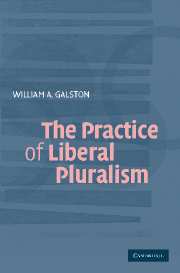Book contents
- Frontmatter
- Contents
- Acknowledgments
- 1 Introduction
- PART I PHILOSOPHICAL FOUNDATIONS OF LIBERAL PLURALISM
- PART II LIBERAL PLURALISM AND PUBLIC ACTION
- 5 Value Pluralism and Political Means: Toughness as a Political Virtue
- 6 Value Pluralism and Motivational Complexity: The Case of Cosmopolitan Altruism
- PART III POLITICS, MARKETS, AND CIVIC LIFE IN LIBERAL PLURALIST SOCIETIES
- PART IV DEFENDING LIBERAL PLURALISM
- Index
6 - Value Pluralism and Motivational Complexity: The Case of Cosmopolitan Altruism
Published online by Cambridge University Press: 18 December 2009
- Frontmatter
- Contents
- Acknowledgments
- 1 Introduction
- PART I PHILOSOPHICAL FOUNDATIONS OF LIBERAL PLURALISM
- PART II LIBERAL PLURALISM AND PUBLIC ACTION
- 5 Value Pluralism and Political Means: Toughness as a Political Virtue
- 6 Value Pluralism and Motivational Complexity: The Case of Cosmopolitan Altruism
- PART III POLITICS, MARKETS, AND CIVIC LIFE IN LIBERAL PLURALIST SOCIETIES
- PART IV DEFENDING LIBERAL PLURALISM
- Index
Summary
INTRODUCTION
This chapter focuses on what I shall call “cosmopolitan altruism” – the motivationally effective desire to assist needy or endangered strangers. Section 1 describes recent research that confirms the existence of this phenomenon. Section 2 places it within interlocking sets of moral typologies that distinguish among forms of altruism along dimensions of scope, interests risked, motivational source, and baseline of moral judgment. Section 3 explores some of the relationships between altruism – a concept rooted in modern moral philosophy and Christianity – and the understanding of virtue and friendship characteristic of Aristotelian ethical analysis. Finally, Section 4 argues that cosmopolitan altruism does not represent moral progress simpliciter over other, less inclusive views, and that the widening of moral sympathy to encompass endangered strangers entails significant moral costs.
The underlying purpose of this chapter is to explore the implications of value pluralism for our understanding of motivation. Descriptively, value pluralism is linked to a diversity of motivations for action and of dimensions along which these motivations vary. Normatively, value pluralism suggests the hypothesis that there is unlikely to be just one account of motivation that is best for, or required of, all individuals at all times. Rather, there is likely to be a range of legitimate variation, representing different combinations and weightings of dimensions of motivation, and a heavy emphasis on any single dimension will entail sacrifices along others.
THE ACTUALITY OF ALTRUISM
The debates over altruism during the past generation revolved around two issues: the possibility of altruistic behavior, and the desirability of such behavior.
- Type
- Chapter
- Information
- The Practice of Liberal Pluralism , pp. 95 - 114Publisher: Cambridge University PressPrint publication year: 2004

